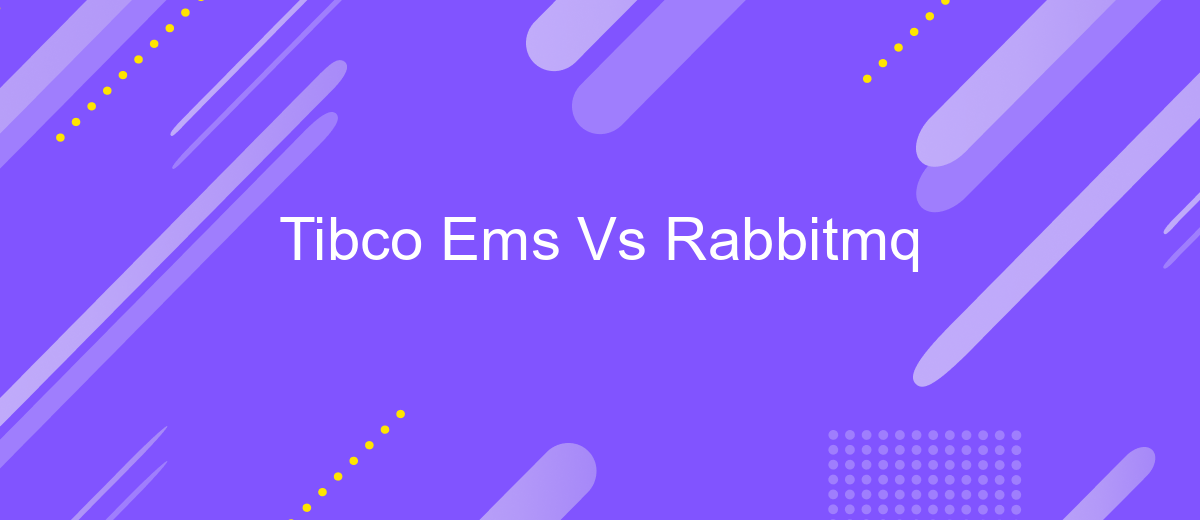Tibco Ems Vs Rabbitmq
When it comes to enterprise messaging systems, Tibco EMS and RabbitMQ are two prominent contenders in the market. Both offer robust solutions for message brokering, yet they differ significantly in architecture, scalability, and feature sets. This article delves into a comparative analysis of Tibco EMS and RabbitMQ, highlighting their strengths, weaknesses, and best use cases to help you make an informed decision.
Comparative Analysis
When comparing Tibco EMS and RabbitMQ, both have their unique strengths and use cases. Tibco EMS is known for its robust enterprise-level messaging capabilities, offering high reliability and scalability. On the other hand, RabbitMQ excels with its open-source flexibility and ease of integration with various platforms.
- Performance: Tibco EMS generally offers higher performance in high-throughput environments, while RabbitMQ is optimized for scenarios requiring flexible routing and message patterns.
- Ease of Use: RabbitMQ is easier to set up and configure, making it ideal for smaller projects or teams with limited resources. Tibco EMS, however, provides extensive enterprise features that require more complex setup.
- Integration: RabbitMQ supports numerous plugins and third-party integrations, such as ApiX-Drive, which can simplify the integration process. Tibco EMS integrates well with other Tibco products and enterprise systems.
- Cost: RabbitMQ, being open-source, is generally more cost-effective. Tibco EMS, while more expensive, offers comprehensive support and enterprise-grade features.
Ultimately, the choice between Tibco EMS and RabbitMQ depends on the specific needs of your project. For high-performance, enterprise-level applications, Tibco EMS may be the better choice. For flexibility and ease of integration, especially with tools like ApiX-Drive, RabbitMQ is often preferred.
Features Comparison

Tibco EMS and RabbitMQ are both powerful messaging systems, but they offer distinct features. Tibco EMS provides robust support for enterprise-level messaging, including advanced security features, transaction management, and extensive monitoring tools. It is highly suitable for complex, large-scale environments where reliability and performance are critical. On the other hand, RabbitMQ excels in ease of use and flexibility, supporting multiple messaging protocols like AMQP, MQTT, and STOMP. It is open-source and has a vibrant community, making it a cost-effective solution for various applications.
When it comes to integration capabilities, both platforms offer extensive support. Tibco EMS integrates seamlessly with other Tibco products and various third-party systems. RabbitMQ, with its plugin architecture, supports a wide range of integrations, including cloud services and microservices architectures. For users looking to simplify integration processes, services like ApiX-Drive can be particularly useful. ApiX-Drive provides an intuitive interface to connect different applications and automate workflows, enhancing the capabilities of both Tibco EMS and RabbitMQ in diverse environments.
Performance Benchmarking

Performance benchmarking is crucial when evaluating messaging systems like Tibco EMS and RabbitMQ. Both platforms provide robust solutions for message queuing, but their performance can vary significantly based on use cases and configurations.
- Throughput: Tibco EMS is known for its high throughput, especially in enterprise environments where large volumes of messages need to be processed quickly. RabbitMQ, while also capable of high throughput, may require more fine-tuning to achieve similar performance.
- Latency: Tibco EMS typically offers lower latency due to its optimized architecture for enterprise messaging. RabbitMQ, however, can achieve low latency with proper configuration and resource allocation.
- Scalability: Both Tibco EMS and RabbitMQ are scalable, but RabbitMQ's clustering and federation features provide more flexibility in distributed environments.
When integrating these messaging systems into your infrastructure, tools like ApiX-Drive can simplify the process. ApiX-Drive facilitates seamless data transfer and synchronization between various applications, ensuring that your messaging system operates efficiently and reliably. By leveraging such services, you can optimize the performance of Tibco EMS and RabbitMQ to meet your specific needs.
Use Cases and Suitability

Tibco EMS and RabbitMQ are both robust messaging solutions, each suited for different use cases. Tibco EMS is ideal for large enterprises that require high reliability, extensive transactional support, and seamless integration with other Tibco products. It excels in environments where guaranteed message delivery and advanced security are critical.
RabbitMQ, on the other hand, is a versatile and lightweight option suitable for startups and mid-sized businesses. It supports multiple messaging protocols and is known for its ease of use and flexibility. RabbitMQ is particularly effective in microservices architectures and real-time web applications where speed and scalability are essential.
- Tibco EMS: Financial services, large-scale enterprise applications, and systems requiring high availability and transactional integrity.
- RabbitMQ: E-commerce platforms, social media applications, and IoT solutions needing rapid message processing and horizontal scalability.
For businesses looking to streamline their integration processes, services like ApiX-Drive can be invaluable. ApiX-Drive simplifies the connection between various applications and services, making it easier to implement both Tibco EMS and RabbitMQ in diverse environments. This ensures a seamless and efficient workflow, regardless of the messaging solution chosen.
Integration and Deployment
When it comes to integration and deployment, Tibco EMS and RabbitMQ offer distinct approaches tailored to different use cases. Tibco EMS, being an enterprise-grade messaging system, provides robust integration capabilities with various enterprise applications. Its deployment is often more complex, requiring careful planning and configuration to ensure high availability and fault tolerance. Tibco EMS supports a wide range of protocols and standards, making it suitable for large-scale, mission-critical environments where reliability and performance are paramount.
RabbitMQ, on the other hand, is known for its simplicity and ease of deployment. It is well-suited for cloud-native applications and microservices architectures. RabbitMQ supports numerous plugins and extensions, allowing for flexible integration with other systems. Tools like ApiX-Drive can further simplify the integration process by automating data synchronization between RabbitMQ and various third-party applications. This makes RabbitMQ an attractive choice for businesses looking to quickly deploy and integrate messaging solutions without extensive overhead.
- Automate the work of an online store or landing
- Empower through integration
- Don't spend money on programmers and integrators
- Save time by automating routine tasks
FAQ
What are the primary differences between Tibco EMS and RabbitMQ?
Which one is better for handling high-throughput messaging?
Can Tibco EMS and RabbitMQ be integrated with other systems easily?
How do Tibco EMS and RabbitMQ handle message durability and reliability?
Are there any tools available for automating the integration and setup of Tibco EMS and RabbitMQ?
Apix-Drive will help optimize business processes, save you from a lot of routine tasks and unnecessary costs for automation, attracting additional specialists. Try setting up a free test connection with ApiX-Drive and see for yourself. Now you have to think about where to invest the freed time and money!


